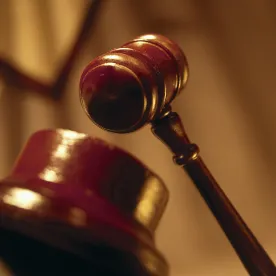The US Court of Appeals for the Second Circuit found that the federal Copyright Act preempts a state right of publicity claim when the latter is merely “a thinly disguised effort to exert control over an unauthorized [use of a copyrighted] work.” Jackson v. Roberts, Case No. 19-480 (2d Cir. Aug. 19, 2020) (Leval, J.).
Both parties in this case are famous hip-hop artists more commonly known by their stage names: the plaintiff, Curtis James Jackson III, is known as 50 Cent, and the defendant, William Leonard Roberts II, is known as Rick Ross. In 2015, Roberts released a free mix tape that included samples from many famous songs, including Jackson’s hit “In Da Club.” The mix tape track at issue was titled “In Da Club (Ft. 50 Cent)” and included Rick Ross rapping over the “In Da Club” instrumentals, a 30-second sample of 50 Cent singing the “In Da Club” refrain, and multiple references to Rick Ross’s upcoming album.
Jackson sued Roberts, claiming that the unauthorized use of his name and voice violated his right of publicity under Connecticut common law. Pursuant to a recording agreement with his former record label, Shady Records/Aftermath Records, Jackson did not own a copyright interest in the “In Da Club” recording and therefore could not sue for copyright infringement. The district court granted Roberts’s motion for summary judgment, finding that Jackson had surrendered his publicity rights via the recording agreement and that the right of publicity claim was preempted. Jackson appealed.
The Second Circuit agreed that federal law preempted the right of publicity claim, but for different reasons than the district court: the Second Circuit found the state claim preempted under the doctrine of implied preemption or, alternatively, statutory preemption. The Court explained that “generally . . . implied preemption precludes the application of state laws to the extent that those laws interfere with or frustrate the functioning of the regime created by the Copyright Act. Statutory preemption preempts state law claims to the extent that they assert rights equivalent to those protected by the Copyright Act, in works of authorship within the subject matter of federal copyright.”
The Second Circuit used a two-part test to determine whether the state law claim was subject to implied preemption, asking (1) whether the state right of publicity claim asserted a sufficiently substantial state interest, distinct from those interests underlying federal copyright law, and (2) whether the state law claim would potentially conflict with rights established by the Copyright Act. Given that Roberts did not use Jackson’s name or persona to falsely imply Jackson’s endorsement of Roberts’ music, nor did Roberts invade Jackson’s privacy or use his persona in a derogatory nature, the Court reasoned that Jackson was not seeking to vindicate any distinct and substantial state interest. Likewise, the Court held that the second element was satisfied because Jackson’s right of publicity suit had the potential to interfere with the copyright holder’s exclusive control of its rights: “Jackson’s attempt to [control the use of the recording] under the disguise of a right of publicity claim was in derogation of Shady/Aftermath’s exclusive right to enforce the copyright.”
The Second Circuit also analyzed whether the right of publicity claim was expressly preempted by § 301 of the Copyright Act. Using another two-part test, the Court assessed (1) whether the work at issue fell within the subject matter of copyright per Sections 102 and 103 of the Copyright Act, and (2) whether the state right asserted against that work was “equivalent to any of the exclusive rights within the general scope of copyright as specified by section 106.”
Jackson argued that preemption did not apply because the subject of his claim was his identity or likeness (i.e., the sound of his voice and his stage name, neither of which fall within the subject matter of copyright). The Second Circuit disagreed, however, concluding that the claim fell within the subject matter of the Copyright Act because “the gravamen of Jackson’s right of publicity claim, to the extent it is based on the use of the ‘in Da Club’ sample, is not the use of his identity but rather the use of the copyrighted work itself.”
With respect to the second element, the Second Circuit noted that “[t]he critical inquiry . . . is whether . . . extra elements of the state claim beyond what is required for copyright infringement ‘change the nature of the action so that it is qualitatively different from a copyright infringement claim.’” Acknowledging that there is some debate about whether a Connecticut right of publicity claim includes a “commercial use” element, the Court noted that even if such a requirement existed, it did not sufficiently differentiate the claim from a copyright infringement claim. Accordingly, the Court held that both elements for statutory preemption were satisfied.
Finding that Jackson’s right of publicity claim was preempted via the doctrine of implied preemption or under the express terms of the Copyright Act, the Second Circuit affirmed the district court’s grant of summary judgment for Roberts.




 />i
/>i

